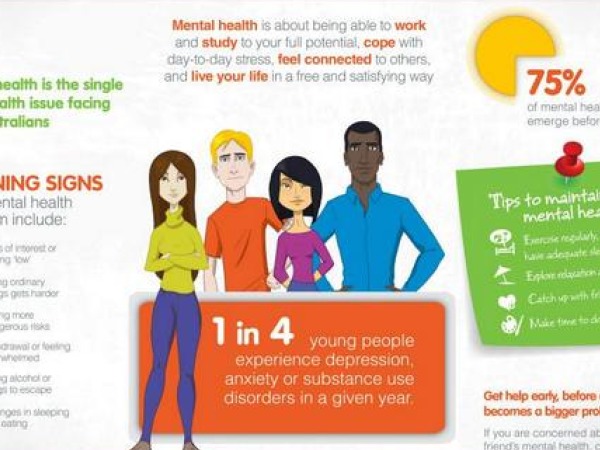It is estimated that 27 per cent of Australians aged between 18 and 25 experience mental health problems every year.
This means around one in four young people will deal with the symptoms of illnesses such as depression, anxiety, bipolar, eating disorders and excessive substance abuse, but only one in four of them will receive professional help for their issues.
There are many possible reasons why so many do not seek the necessary treatment, ranging from a lack of resources to more personal and psychological reasons, including embarrassment, a lack of knowledge about mental health and stigma.
“Access to services is one issue, particularly in regional and remote Australia,” Dr Brian Graetz, the Deputy CEO of beyondbluebus, tells upstart.
“But even with services there’s strong reluctance from young people and adults to go get help – for example, there’s issues of fear, or being ashamed or embarrassed. Not wanting anyone to know, feeling that they’re only ones who have these difficulties.”
It’s World Mental Health Day – be sure to check out our infographic covering warning signs, tips & support #WMHD2014 pic.twitter.com/b7jhCJwklt
— headspace (@headspace_aus) October 9, 2014
This social and personal stigma surrounding mental illness is the most cited reason for young people to avoid seeking help.
Dr Graetz says the best way to battle the stigma surrounding mental health problems is through education and changing the way people view mental health.
“We need to normalise mental health, so the idea that mental health isn’t just mental illness,” he says.
“[It] is actually the full continuum from someone who is doing well and managing their challenges in life to someone who’s not doing particularly well. It’s like the physical health concept- the idea that we sometimes it’s going to be good and sometimes it’s going to be a challenge.”
Campaigns like beyondbluebus and the events of last week’s Mental Health Week are helping educate people about mental health and foster a better understanding of mental health issues. It can be hard, however, to override the self-shame felt by some people struggling with their mental health.
“They’re quite significant barriers for a lot of people, those psychological barriers, because they’re hard to overcome. You don’t really like to admit you’ve got an issue or a problem,” says Dr Graetz.
25-year-old Becks Mollica says she didn’t realise she had any issues as a teenager. She used to engage in regular self-harming behaviours and was anorexic and bulimic.
“I didn’t believe that my behaviours were a problem as they made me feel like I could cope with whatever life threw at me on a daily basis,” she tells upstart.
“I hesitated seeking help because I didn’t believe I had a problem. The behaviours I was engaging in made me feel good, so until I was told otherwise, I was naïve to the fact that I was slowly killing myself.”
Mollica’s behaviours caused her body to begin to shut down and she started losing her will to live. Her family, friends and GP became concerned and she was told that if she did not seek professional help she would be admitted to hospital under the Mental Health Act.
“I had the opinion that if I had a so called “issue” that needed treatment to recover from, that I wanted to be in control of that process and not have others doing it for me,” she says.
Mollica’s first step was to research what her behaviours meant.
“I came across ReachOut.com and learnt that my behaviours were incredibly unhealthy and it gave me a clear indication as to why people were so worried about me”.
Dr Graetz says research is a good first step for anyone worried about the state of their mental health.
“I think the first thing I would suggest is that they go and look on websites for information. I think it’s good to find out more about what you’re experiencing. Go to some reliable websites, and have a look at what healthcare professionals are available and what they do.”
Dr Graetz also suggests speaking to friends or family about mental health issues can make seeking help easier.
Mollica took the next step and sought professional help and says it is the reason she is still alive and living a wonderful life.
She was diagnosed with Bipolar Disorder and still sees her psychiatrist every month, but she now describes herself as mentally stable and is a Mental Health Community Support Worker.
“My mental state is so much better now that I’ve received outside help. Dealing with everything by myself meant that I was killing myself in a slow and painful way. Getting the treatment I needed helped me to realise that my behaviours weren’t healthy, and that I could overcome them and live a good life.”
You can find more information about mental health at beyondblue, headspace and ReachOut.
You can also call Lifeline (13 11 14).
Erin Leeder is staff writer and a second-year Bachelor of Journalism student at La Trobe University. She is on Twitter: @155erin.








